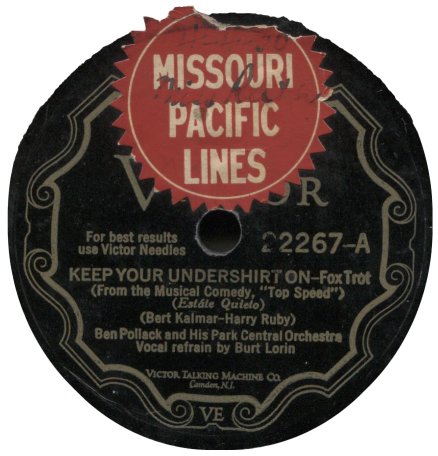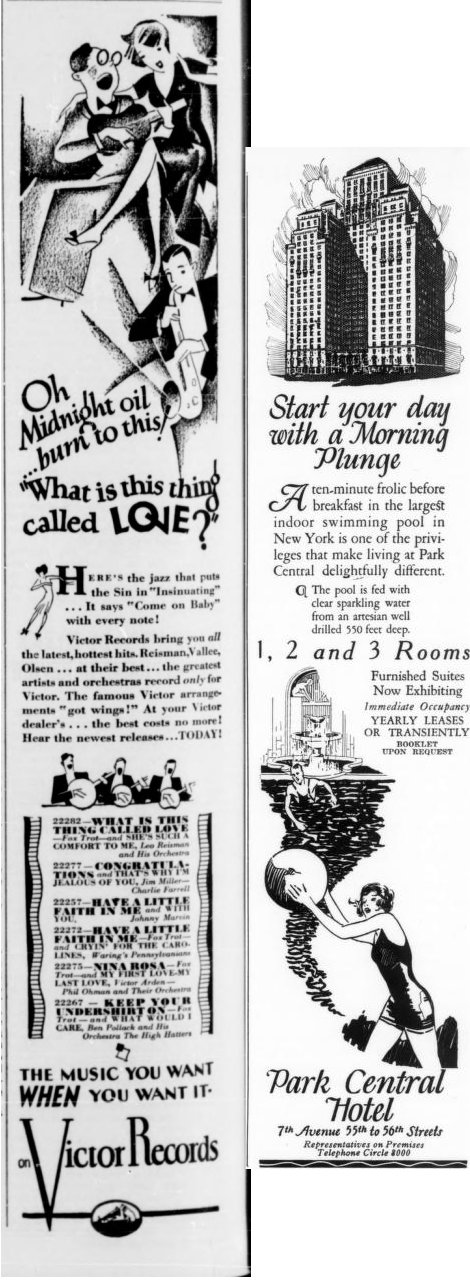
“Keep Your Undershirt On”
Ben Pollack And His Park Central Orchestra; Burt Lorin, vocal
(Victor 22267-A) November 29, 1929
“What Would I Care?”
The High Hatters; Frank Luther, vocal
(Victor 22267-B) January 3, 1930
Here are two dance band recordings of very catchy songs that, through circumstances, quickly faded into obscurity.
Both songs are from the 1929 musical Top Speed – a production that was the Broadway debut of the then-rising star Ginger Rogers.
“Keep Your Undershirt On” was recorded on November 29, 1929, almost a month before the show’s Christmas Day premiere. It was not uncommon for record labels to record songs ahead of their formal debut on stage so that the record could be available in stores while the show was still running.
“What Would I Care?” was recorded on January 3, 1930. Here, too, it was not uncommon for labels to record songs shortly after their stage debut. But the record did not make its way to stores until March, less than a month before the Broadway production closed on March 22 after a run of 104 shows.
First National Pictures subsequently made a film version of the show, which was released to theaters on August 24, 1930. The movie was originally planned and filmed as a musical. However, by the time filming had been completed, musical films were being punished at the box office as audiences became weary of the glut of such films that the Hollywood studios had been releasing. Therefore, a decision was made to cut out most of the film’s musical numbers for its American release – including the ones featuring the songs here.
The film was also released in various foreign markets, including the United Kingdom, Sweden, and Brazil. In those markets, the musical numbers were not cut and were seen in their entirety. Unfortunately, the only copy of the film known to still exist is the cut-down American release and the footage of the omitted musical numbers is believed to be lost. However, the soundtrack to the missing scenes still survives on Vitaphone discs.
I am not able to find mention of any other recording of “Keep Your Undershirt On” having been made in the United States or Britain other than the one here by Ben Pollack and His Park Central Orchestra. And the only recording of “What Would I Care?” I can find mention of having been made in either country was by Fred Rich and His Orchestra on Columbia 2099-D, which was coupled with a Cole Porter composition unrelated to the film.
Had the songs not been cut from the film, there is a chance that additional recordings might have been made.
I have read that the lyrics to “Keep Your Undershirt On” were regarded as scandalous enough to have been banned on radio broadcasts. However, I was not able to find any definitive source for that claim, nor was there any mention as to whether such a ban was by the networks or by individual stations.
What is known is that, at the time, radio was far more sensitive to content that might cause scandal than were the record labels and film studios. Some music publishers even published versions of certain songs with alternative, sanitized lyrics that were considered safe for broadcast performance. Such concerns became a factor for film producers in 1934 when the studios began self-censoring under the Hays Code.
“Keep Your Undershirt On” was cut from Top Speed in 1930 due to the public’s lack of interest in musical numbers. But, after the Hays Code came into effect, it is highly unlikely that the song would have been permitted in any American film.
Ben Pollack’s band was enjoying an extended engagement at New York’s Park Central Hotel when it recorded “Keep Your Undershirt On.” Happily, the hotel is still standing, though, unfortunately, its once-grand interior has long since been destroyed and uglified.
Pollack was able to attract top-rate musicians to his band but often had difficulty keeping them. There are numerous mentions that, in his later years, Pollack became bitter over the fact that many of his former sidemen had eclipsed him in fame and success.
Pollack’s was one of the more successful bands of the 1920s. But, in the early 1930s, to the frustration of his musicians, his focus was increasingly on promoting the career of his vocalist and future wife, Doris Robbins. In 1934 most of his musicians quit and formed their own band, which eventually hired Bing Crosby’s younger brother, Bob Crosby, to become its frontman.
The vocal credit on the Pollack recording is listed as Burt Lorin. But that was merely a recording pseudonym for Harold “Scrappy” Lambert, one of several studio vocalists that record labels of the era retained to be available for recording sessions by both their in-house bands and their roster of name bands.
The only recordings during this period issued under Lambert’s own name seem to have all been on Brunswick, which leads me to suspect he probably had an exclusive contract with that label. But in those days, many recording contracts only granted the labels the exclusive use of an artist’s name and did not prohibit recording for other labels so long as it was done under a different name.
Recording sessions were quite lucrative for artists as they paid a flat, upfront fee per recording regardless of whether the record was successful or not. Replacing the income that would be lost by a prohibition on recording for other companies was something that the labels were usually not willing or able to do.
One will sometimes see commentary expressing disapproval over the fact that recording artists usually did not receive royalties. However, it is highly doubtful that most artists would have been interested in accepting a lower up-front fee in exchange for royalties based on sales. Most 78 rpms quickly went out of print and, even after the advent of the LP record decades later made reissues of older recordings more feasible, only a small percentage ever were reissued.
The High Hatters was a pseudonym for a Victor in-house band directed by Leonard Joy. The band typically recorded songs from current stage and film productions, and almost all of their recordings featured upbeat and happy arrangements. Frank Luther provides the vocal for the recording here.
I do not know the story behind why someone placed a sticker advertising the Missouri Pacific Lines on the copy of the record from which I made these transfers. Sometimes, individual retailers would place a sticker with their shop’s name on the records they sold. But I seriously doubt that phonograph records would have been an item likely to have been sold in train stations. Books – yes. Phonograph records – doubtful. An online search suggests that the sicker was most likely a luggage label provided to passengers.
Two lines of writing are on the sticker. The second line seems to begin with Miss R…, followed by letters I can’t make out. The first line is hard to make out – but my best guess is that it says 4-4-70. So one guess is that, in April 1970, the record might have been a gift from or to a lady whose last name started with R. Why a sticker advertising Missouri Pacific would have been used is beyond me. Perhaps it was a gift from a child and, since black ink would not have been visible against the black label, the sticker was used as the one thing handy that could be attached for the inscription to be written on.

